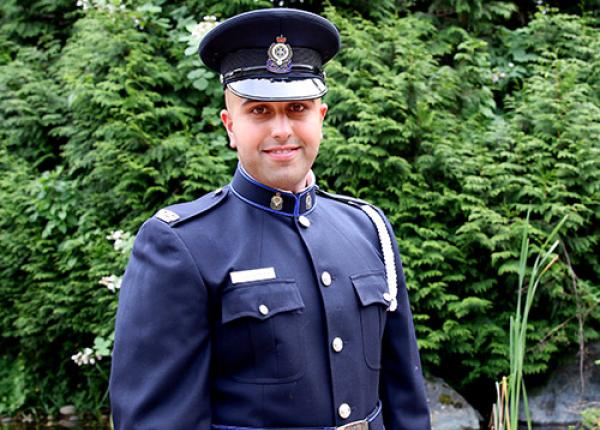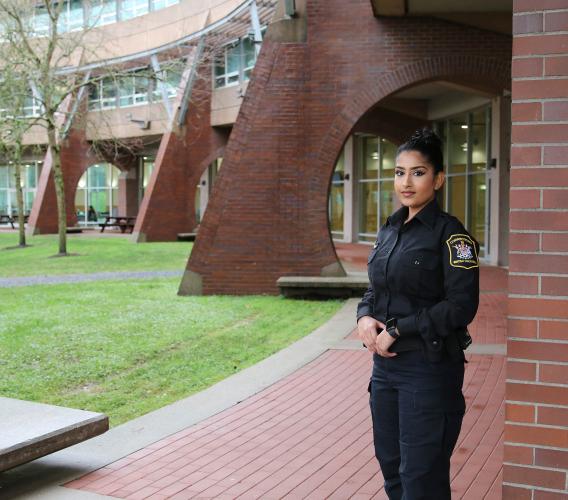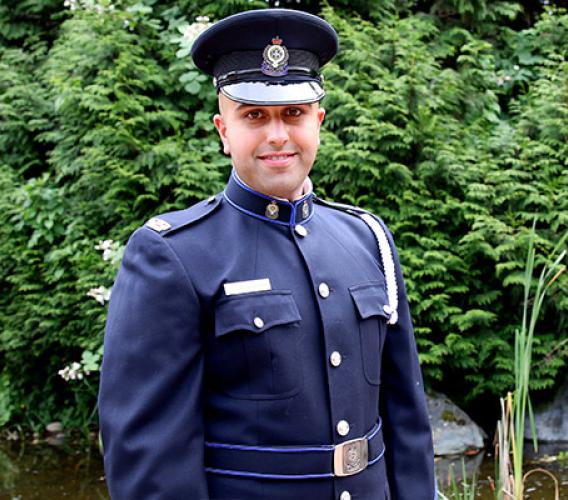
Is this program right for you?
If you have a relevant diploma or work experience and want to pursue a career in law enforcement or public safety, this degree can help you take the next step.
You’ll learn from instructors with real-world expertise, gaining both academic knowledge and practical skills. The program includes an applied research project that advances the study of law enforcement and criminal justice—helping you stand out as a job candidate.
Graduates leave ready to serve their communities and succeed in a range of law enforcement and public safety roles.
- People pursuing a career in law enforcement or public safety.
- Current law enforcement or public safety professionals seeking career advancement.
- Individuals who:
- Act with integrity and accountability.
- Are compassionate and respectful.
- Have strong communication skills.
- Value fitness, health, and wellness.
- Want to serve the public and represent their community.
- Have a clean criminal record.
Program strengths
- Builds in-depth knowledge of law enforcement and criminal justice in Canada.
- Develops transferable skills in research, critical thinking, analysis, and communication.
- Taught by experienced professionals in the field.
- Opportunities for applied research to advance the profession.
- Graduates work in roles such as:
- Police constable
- Bylaw officer
- Deputy sheriff
- Correctional officer
- Investigator
- Probation officer
- Border services officer
You’ll gain advanced qualifications and practical skills, including:
- Critical thinking and problem-solving
- Communication and conflict resolution
- Negotiation and mediation
- Organizational theory and leadership
- Case management
- Restorative and community justice
You’ll also complete an applied research project that contributes to the study and practice of law enforcement and criminal justice.
What You Need to Graduate
Students must successfully complete all 60 credits in the program while maintaining a GPA of 2.0.
Program Formats
Students have the option to complete the program on campus or online.
On-Campus Cohort-Based Program
The in-person format provides a full-time student experience at our New Westminster campus. We offer small class sizes, in a cohort-based model, where students move through the two-year program as a group. Students can take classes in the fall and winter semesters. They will follow an assigned schedule and attend five classes per week. We do not offer summer classes.
Online Program
The online format does not have scheduled weekly classes or lecture times. So students can take classes at their convenience. Instructors deliver all content online and students are not required to attend any in-person activities or exams. Students can work at their own pace to complete weekly assignments, readings, and meet due dates. This is a good option for students who want to study part time.
Students are responsible for directing their own studies in this format. So, time management and study skills are crucial for successful completion. Classes are available year-round in the fall, winter, and summer semesters. Students in the online offering have up to five years to complete the program and may take up to five classes per semester.
Upcoming intakes & Application Deadlines
On-Campus Cohort-Based Program
Intake: One intake per year: September start
Application Deadline: March 26, 2026
Online Program
Intakes: Three intakes per year: September, January, or May
Application Deadlines: Apply up to six weeks before the start of the semester. Based on seat availability, applicants may be deferred to the next intake.
Tuition
Domestic Student Tuition is $708.65 per course (as of April 1, 2025).
International Student Tuition is approx. $20,500 per year.
Additional Fees
- Learner Services Fee $19.56 per course
- Non-refundable application fee $75 (domestic)
- Textbooks and equipment additional cost
- Applicable Student Union and health insurance fees can be found at jisu.ca.
Textbooks & Supplies
Course manuals textbook lists are supplied when you attend class. If additional books or other materials are required, you will be advised when you are accepted into the program.
Click here to see the 2026 Winter Textbook list.
STEP ONE - Apply to the Program
Check the program application deadline date.
Apply by registering online at EducationPlannerBC and completing the online program application form.
STEP TWO - Submit Supporting Documents
Prepare and submit supporting documentation along with payment to the Admissions Office in person, by mail or email. All documents must be received by the application deadline.
In-Person or By Mail
Admissions Office
Justice Institute of British Columbia
715 McBride Boulevard
New Westminster, BC V3L 5T4
Note: The BLES degree is a competitive entry program and will make all admissions decisions based on the merit of the application. This includes a competitive GPA combined with an assessment of the required courses and supplemental documents. Only complete applications will be considered.
Admission Requirements
Standard Admission
- A related two-year diploma from a recognized post-secondary institution with a minimum CGPA of 2.0;
- High school graduation with a minimum grade of a C in 12 English, or the approved equivalent.
- English Requirements for International Students
Furthering a Career in Law Enforcement or Public Safety
Advanced Standing Credits
- Have completed a peace officer training program such as the RCMP Basic Training Program, the JIBC Municipal Recruit Training Program, or the Ontario Police College and;
- Have completed a minimum of 3 years of full-time service in a recognized public safety agency with an Advanced Standing Assessment that would allow for up to 60 credits to be granted towards the completion of the degree program.
- Other law enforcement professionals with training and experience may also have their applications reviewed for Advanced Standing Credits. Some situations may require that applicants apply for a Prior Learning Assessment
Please apply to the program and provide training records, any post-secondary transcripts and a detailed CV or resume. Applicants may be contacted to provide additional information for review.
Applicants may be required to complete pre-requisite courses before beginning studies in the BLES program.
Financial Aid and Awards
Candidates for this program may be eligible for JIBC awards and bursaries including the JIBC General Student Bursary. All students are encouraged to apply.
For more information, contact Student Services or the Financial Aid & Student Awards Advisor.
International Applicants
International applicants are encouraged to visit the International Studies page or contact JIBC's Office of International Affairs.
Prior Learning Credits
JIBC has a Recognition of Prior Learning (RPL) policy. As part of the British Columbia public post-secondary system, JIBC is a full participant in the credit transfer system of the BC Council on Admissions and Transfer.
Program FAQ
Q: I finished high school quite a few years ago but am interested in taking this program. Am I eligible?
A: JIBC recognizes “mature learner” status. These policies and procedures recognize that today’s learners who wish to pursue post-secondary education may come from diverse learning backgrounds. Desirable admission requirements include computer literacy and relevant work or volunteer experience. An in-person interview and assessment to determine suitability may be required. Related work experience and/or study will enhance your application.
Q: Can I use this degree to transfer into a graduate program?
A: The Bachelor of Law Enforcement Studies degree may be eligible for transfer to graduate studies programs in many areas including law school, criminology and public administration.
Q: What is the difference between the on-campus and online formats of the program?
A: The on-campus, in-person format provides a full-time, on-campus student experience at the New Westminster campus. It features small class sizes in a cohort-based model where students move through the two-year program together as a group. Classes are offered in the fall and winter semesters with no classes in the summer. Students follow an assigned schedule and attend five classes per week. Tuition for an entire semester of classes are due prior to the start of the semester.
The online format is delivered asynchronously, which means it does not have scheduled weekly classes or lecture times. This format provides flexible study options where students can work at their own pace to complete weekly assignments, readings and meet set due dates. This is a good option for students wishing to study part time. Time management and strong study skills are extremely important as students are responsible for directing their own studies. All content is delivered online with no requirements to attend in-person activities or exams. Classes are offered year-round in the fall, winter and summer semesters. Students in the online offering have up to five years to complete the program and may take up to five classes per semester. Students select their own classes based on available courses, self-enroll and pay tuition at the time of enrolment.
Q: What jobs does this degree prepare me for?
A: Examples of special law enforcement roles include police officers, conservation officers, animal cruelty officers, border services agency officials, investigators, by-law enforcement officers, domestic and international transportation safety and security professionals, gaming investigators, inspectors, correctional officers, probation officers, deputy sheriffs and courts officials.
Note that border services officers, police officers, correctional officers, probation officers, deputy sheriffs, and security professionals must all complete additional mandated training. Employers in other investigation, law enforcement, and regulatory agencies may have additional entry or qualification and training requirements.
Courses in This Program
Year 3
Year 4
Textbooks
Click here to see the 2026 Winter Textbook list.





